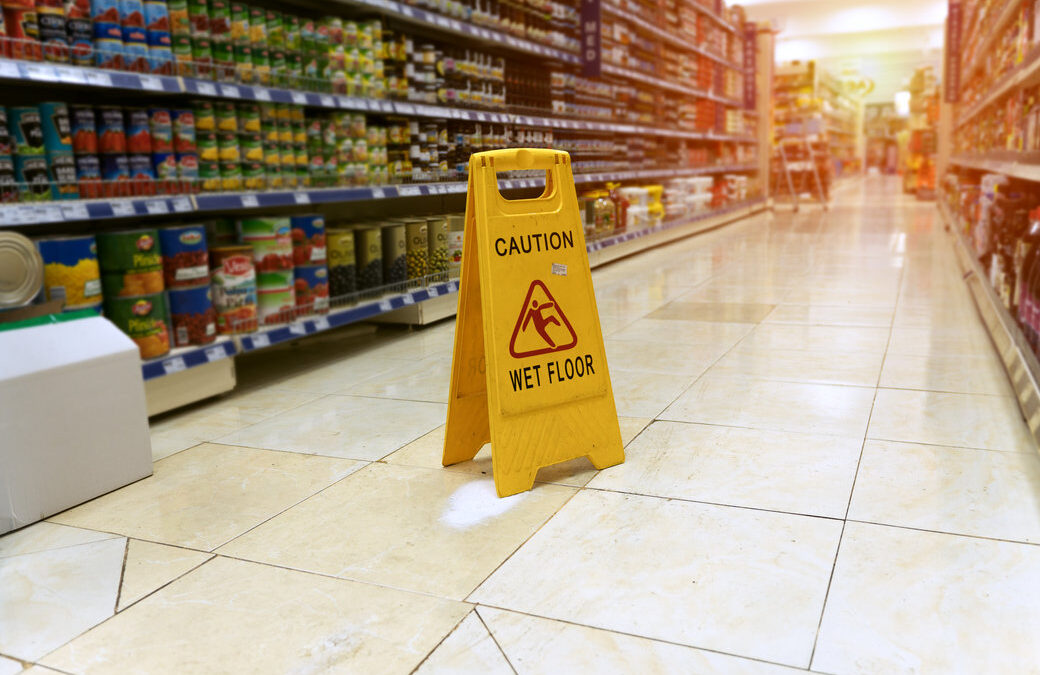Setareh Law
September 17, 2025
Grocery store slip and fall accidents can cause serious injuries ranging from broken bones and sprains to traumatic brain injuries and spinal cord damage, leaving victims facing mounting medical bills and lost wages while dealing with complex legal questions about proving the store’s responsibility for their accident. These cases require establishing that the grocery store failed to maintain safe conditions or adequately warn customers about dangerous hazards, which involves gathering specific types of evidence and understanding the legal standards that courts apply to premises liability claims.
At Setareh Law, our legal team has extensive experience helping slip and fall victims navigate the complex process of proving negligence against grocery stores and other commercial property owners throughout California. We understand the tactics that stores and their insurance companies use to avoid liability and work diligently to build compelling cases that demonstrate our clients’ right to full compensation for their injuries and damages.
The Four Elements of Negligence in Slip and Fall Cases
Proving negligence in grocery store slip and fall cases requires establishing four essential legal elements that demonstrate the store’s responsibility for your accident and resulting injuries. First, you must show that the store owed you a duty of care as a customer, which grocery stores clearly have toward their patrons who are lawfully present on the premises for business purposes.
The second element involves proving that the store breached this duty of care through action or inaction that created or failed to address dangerous conditions. This might include failing to clean up spills promptly, neglecting to place warning signs around wet areas, or allowing damaged flooring to remain unrepaired despite knowledge of the hazard.
Causation represents the third critical element, requiring proof that the store’s breach of duty directly caused your slip and fall accident. You must demonstrate that the dangerous condition was the actual and proximate cause of your injuries rather than some other factor or pre-existing condition that contributed to your fall.
Gathering Critical Evidence at the Scene
Collecting evidence immediately after a grocery store slip and fall accident can make the difference between a successful claim and a denied case, as stores often quickly address hazardous conditions after accidents occur. Taking photographs of the accident scene, the hazardous condition that caused your fall, and your visible injuries provides crucial documentation that may not be available later.
Witness statements from other customers or store employees who saw your accident can provide valuable testimony about the conditions that existed at the time of your fall. Store employees may also have knowledge about how long dangerous conditions existed, whether management was aware of the hazard, and what steps were or were not taken to address the situation.
Obtaining incident reports and surveillance footage requires prompt action, as many stores have policies limiting how long they preserve security recordings. The following evidence should be secured as quickly as possible after your accident:
- Photographs of the accident scene and hazardous conditions from multiple angles
- Contact information for witnesses who observed your fall or the dangerous conditions
- Incident reports filed by store management or security personnel
- Medical documentation of your injuries and treatment received
- Your clothing and shoes worn during the accident for potential analysis
Preserving physical evidence like damaged merchandise, spilled products, or defective flooring materials can help establish the cause of your accident and the store’s knowledge of dangerous conditions.
Common Grocery Store Hazards and Liability Issues
Grocery stores face unique liability challenges due to the constant presence of liquids, produce debris, and high customer traffic that can create dangerous conditions throughout the day. Common hazards include spilled beverages in aisles, produce that has fallen from displays, wet floors from refrigeration units or cleaning activities, and worn or damaged flooring in high-traffic areas that can cause customers to trip or lose their footing.
The key legal question in most grocery store cases involves whether the store had actual or constructive knowledge of the dangerous condition and failed to take reasonable steps to address it. Premises liability law requires stores to conduct regular inspections, maintain safe conditions, and promptly clean up hazards or warn customers about dangers they cannot immediately eliminate. Stores cannot escape liability by claiming ignorance of hazardous conditions that reasonable inspection procedures would have discovered.
Contact Setareh Law for Your Slip and Fall Case
Proving negligence in grocery store slip and fall cases requires thorough investigation, technical knowledge of premises liability law, and the resources necessary to take on large retail chains and their insurance companies. These cases demand prompt action to preserve evidence, detailed analysis of store policies and procedures, and strategic presentation of facts that demonstrate the store’s failure to maintain safe conditions for customers.
Our team at Setareh Law has successfully represented numerous slip and fall victims against major grocery chains throughout California, securing substantial compensation for medical expenses, lost wages, pain and suffering, and other damages. We understand how to build compelling personal injury cases that hold negligent property owners accountable while protecting our clients from insurance company tactics designed to minimize claim values. With over $250 million recovered for our clients and more than 400 five-star reviews, we have the experience and determination needed to achieve maximum compensation for your slip and fall injuries. Contact us today at (310) 659-1826 or through our contact form to discuss your grocery store accident case and learn how we can help you recover the compensation you deserve.


